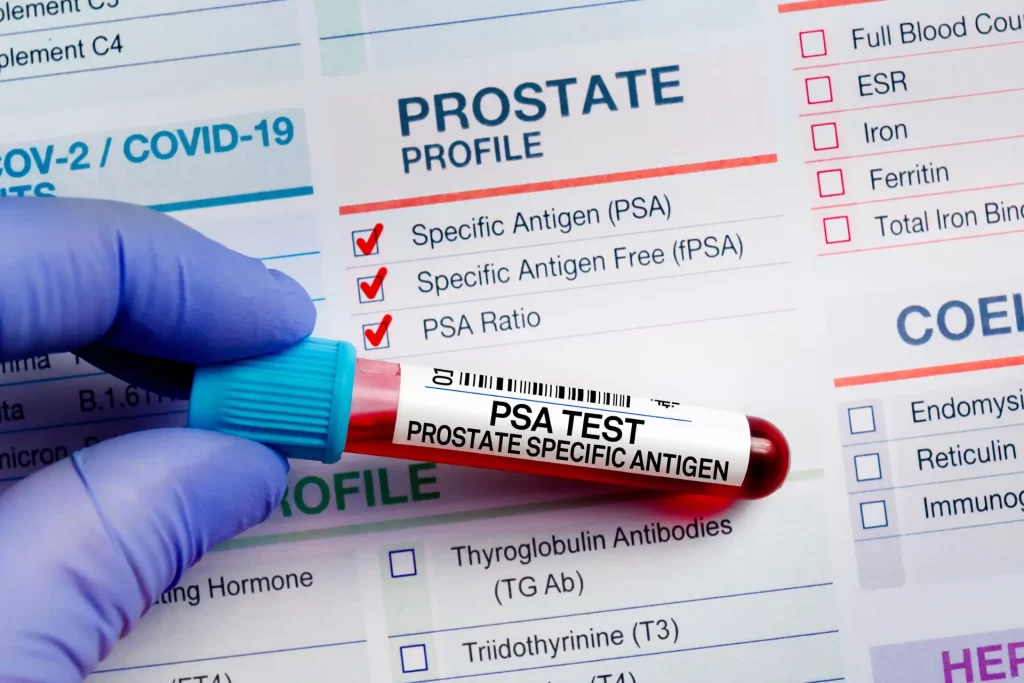
Did you know that prostate cancer is the top most commonly diagnosed cancer affecting men in Singapore? Regular screening is essential in managing the cancer’s impact on men’s health. The prostate-specific antigen (PSA) test is a widely used screening tool designed to screen for prostate cancer. By measuring PSA levels in the blood, the results can provide valuable insights into each individual’s prostate cancer risk.
In this blog article, a prostate cancer specialist in Singapore covers the purpose, procedure, and implications of the PSA test for prostate cancer screening.
What is the PSA Test?

The PSA test is an essential preliminary screening tool for prostate cancer. Undergoing a PSA test is typically the first step in screening for prostate cancer.
The PSA test is a blood test that measures levels of prostate-specific antigen (PSA), a protein that is produced by both healthy and abnormal prostate cells. PSA is naturally present in the blood at low levels. Hence, an elevated PSA level that shows up in test results may signal the presence of prostate cancer or other issues related to the prostate. A small amount of blood sample is taken from the patient’s arm, and the PSA levels are then analysed in a laboratory.
Generally, PSA levels under four nanograms per millilitre (ng/mL) are considered within the normal range. PSA levels above the threshold may indicate an issue with the prostate gland and need to be evaluated further to understand the underlying cause. However, do not panic if your PSA levels are elevated, as this does not necessarily mean you have prostate cancer.
Why is the PSA Test Important?
Early prostate cancers are often without symptoms, and an elevated PSA level may be the only indication of cancer.. PSA test allows for early detection of prostate cancer and can ultimately lead to improved treatment outcomes and reduced chance of cancer spreading beyond the prostate gland. While the PSA test results might not be a definitive diagnosis of prostate cancer, it serves as a helpful initial step in identifying potential prostate conditions.
Who Should Get Tested?
Recommendations for PSA testing are made with consultation with your doctor and based on the following individual risk factors:
- Old Age: General guidelines suggest that men aged 50 and older can consider PSA testing, while those at higher risk may start earlier.
- Family History: Men with a father, brother, or close male relative who has prostate cancer or a close female family member who has been diagnosed with breast cancer.
- Diet Rich in Animal Fat and Low in Fibre: Observational studies found that a “Western diet,” characterised by high consumption of animal fat and fried foods, may be linked to an increased risk of prostate cancer. ဆေးလိပ်သောက်ခြင်း။: Toxic chemicals in cigarettes can influence hormone levels in the body, potentially contributing to an elevated risk of prostate cancer.
- Cadmium Exposure: Individuals frequently exposed to cadmium in occupations such as metalworking or the manufacturing of batteries, electronics, and plastics face a higher risk of developing prostate cancer.
- Human Papillomavirus-16 (HPV-16): Studies have found that HPV-16 can cause gene mutations, increasing susceptibility to prostate cancer.
Consulting with a urologist can help determine the appropriate screening schedule depending on your risk factors.
The Controversy Surrounding the PSA Test
PSA tests may lead to diagnosis of slow-growing prostate cancers that may not pose an immediate threat to the patient’s health. Many of these cancers remain asymptomatic and do not progress significantly during the patient’s lifetime.
Some organisations advocate for routine PSA screening, while others recommend against it for population-based screening of average-risk men due to concerns about overdiagnosis and overtreatment. The decision is now largely left to shared decision-making between patients and their urologists.
Preparing for the PSA Test

No special preparations are needed before PSA testing, although there are some factors that may alter the result. Your urologist will let you know when is a good time to do the test. Additionally, it is important to inform urologists of the medications taken before taking the PSA tests.
Understanding Your Results
During the test, patients can expect a quick blood draw. The process is non-invasive and results are usually available in less than a day.
The PSA test results can provide an indication of prostate cancer risk in general.
PSA levels under 4 ng/mL are typically considered to have a low risk of prostate cancer.
PSA levels above 4 ng/mL may indicate a higher probability of prostate cancer and will require further investigations.
For a proper diagnosis, discussing PSA test results with a urologist is recommended. It is important to note that false positives and false negatives can occur. In other words, elevated PSA levels do not always indicate cancer, and normal PSA levels do not necessarily rule it out. This is because PSA levels can be influenced by factors that may be unrelated to cancer, such as age or benign (non-cancerous) conditions.
Some benign conditions that can elevate PSA levels include:
Benign prostatic hyperplasia: A condition characterised by the enlargement of the prostate gland
ဆီးကျိတ်ရောင်ခြင်း။: Inflammation of the prostate gland.
Next Steps After Testing
Follow-up testing is typically recommended by your urologist to clarify elevated PSA test results and it may include:
A repeat PSA test can be performed after a few weeks to confirm whether PSA levels remain elevated.
ပုံရိပ်ဖော်စစ်ဆေးမှုများ, such as MRI scans or ultrasounds, may be recommended to obtain detailed images of the prostate and pinpoint areas of concern.
A biopsy is a definitive but invasive test that collects tissue samples from the prostate gland for closer examination.
Further testing is important to examine elevated PSA levels to determine the cause and assess any potential cancer risk.
Assure Urology & Robotic Center သို့ သွားရောက်ပါ။
Early detection and understanding of PSA test results can make a significant difference in managing prostate health. If you or your loved one is considering a PSA test, schedule a consultation with Dr Terence Lim, the Senior Consultant Urologist at Assure Urology & Robotic Centre. Our team is here to guide you through each step and provide a tailored healthcare plan to support your optimal prostate health.


